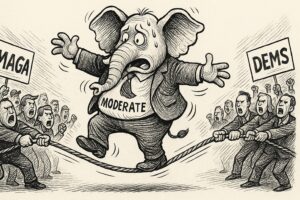⚡ Cutting through noise. Spotlighting the truth.
GOP Moderates at a Crossroads

Amid Triumphs, GOP Moderates Face a Defining Choice
Fresh off a dominant sweep in 2024, Republicans now hold the presidency, control the Senate, and maintain their majority in the House. But behind the victory lap lies a tougher question: should GOP moderates 2026 attempt to steer the party toward centrism, or ride the momentum of its populist, MAGA-fueled base?
For many conservatives, the answer seems obvious. The movement won—big. But party moderates aren’t so sure the coalition is built to last beyond a single cycle.
Key Trend: MAGA Momentum Owns the Base
The 2024 election confirmed what most already sensed—this is now Trump’s GOP. A post-election analysis from the Brookings Institution found that 46% of Republican candidates openly ran as MAGA candidates. That’s not a faction, that’s a majority.
Voters didn’t just go along with it—they backed it. According to data from the Manhattan Institute, Republicans held commanding leads on key issues: border security (+15), immigration (+13), and the economy (+8). These aren’t niche concerns; they hit where working-class and suburban voters live.
The MAGA message wasn’t just loud. It was effective. GOP moderates 2026 now face the risk of swimming against the current of their own base.
Moderation or Momentum?
Not every Republican wants to follow the populist tide forever. Some moderates argue that the 2024 victories could lull party leadership into overconfidence. Yes, the populist push energized turnout. But independents and suburban swing voters remain cautious—many express fatigue with Trump-aligned tactics and rhetoric.
Data from APM Research Lab shows that GOP dominance is real, but fragile. Several battleground districts remain tight, and even small shifts in turnout or approval could flip them in 2026.
Moderates warn: the party’s bold direction might secure headlines, but without strategic balance, it risks future losses.
Democrats Turn to Moderation, Republicans Hold the Line
Ironically, it’s Democrats—not Republicans—calling for moderation after their 2024 losses. According to a Gallup poll cited by Fox 32 Chicago, 45% of Democrats now support a centrist reset. That number is a reflection of electoral failure and internal confusion.
Republicans, meanwhile, appear united. As the Manhattan Institute put it, the GOP is “increasingly sure of who it is, what it stands for, and where it’s going.” That ideological clarity might be what helped them win—especially compared to Democrats’ fractured messaging on topics ranging from border narratives to international credibility.
But clarity without flexibility can become a weakness. Democrats are down now—but if they sharpen their strategy or capitalize on niche voter unrest like in the South African refugee controversy, the GOP’s dominance could slip.
Expert Insights: Victory or Vulnerability?
“The results highlight a GOP increasingly sure of who it is, what it stands for, and where it’s going, while Democrats remain divided over their future leadership and priorities.”
— Manhattan Institute, 2024 Post-Election Analysis
“Most Republican candidates (46%) ran as MAGA candidates… Trump increased his hold over the Republican party… there are still Mainstream Republicans and even a few Moderates running in 2024—indicating that the Trump takeover was not total.”
— Elaine Kamarck, Brookings Institution
While the MAGA movement now defines the party, there remains a sliver of ideological diversity. The question is: how long will it hold?
Contrasting Visions: Stick or Stretch?
There are two schools of thought forming within the GOP.
One argues that staying consistent with the base is the only path forward. Aligning with voters on kitchen-table issues like inflation, crime, and border control wins elections. Compromise dilutes the message and invites defeat.
The other warns that rigid alignment can burn out—as it did with the Tea Party wave. Swing voters are volatile. Suburban independents helped deliver 2024’s win, but they’re not guaranteed in 2026.
Looking ahead, GOP moderates 2026 will have to choose: bend toward the center to safeguard longevity, or double down and risk overextension.
One thing is clear—Republicans currently own the narrative. Even global discussions like the AI-driven diplomacy shaping Ukraine are being framed through a more assertive, nationalist lens. That framing is winning—but for how long?
Readers Also Asked
Why are some Republicans warning against moderation after 2024?
They fear shifting toward the center could fracture the winning coalition. Many believe voters finally see the GOP as aligned with their values—on strong borders, economic fairness, and national defense. Moderation could reverse that perception.
Are moderate Republicans still influential in Congress?
They exist, mostly in swing districts, but their power is limited. With a dominant populist wing and a unified agenda, GOP moderates often find themselves negotiating quietly or breaking ranks only when margins are razor-thin.
How do voters feel about the GOP’s current direction?
Polls show high satisfaction among Republican voters. Independents remain split, but Democrats are increasingly calling for moderation in the wake of repeat losses.
Wrap-Up
- MAGA-driven populism now defines the GOP’s core message.
- GOP moderates 2026 must weigh long-term viability against short-term dominance.
- Democrats are leaning moderate post-defeat; Republicans are holding firm.
- Winning future cycles will depend on knowing when to stand ground and when to adapt.




